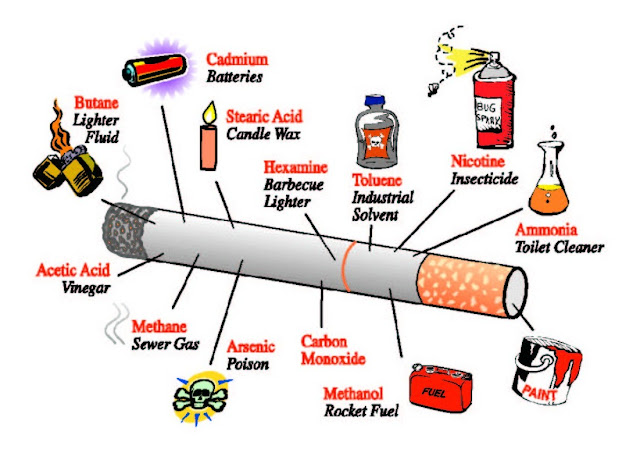What is the meaning of Smoking? Concept, Definition of Smoking
Concept of Smoking
What is smoking
 Smoking is a chronic disease that is characterized as a drug: active ingredient of tobacco, nicotine is an addictive drug and as such has the characteristics of other drugs: tolerance, physical and psychological dependence. Nicotine addiction requires smokers to keep smoking and, in this way, delete or prevent symptoms resulting from the decline in the levels of nicotine in the body (symptoms of deprivation). This generates that people lose the freedom to decide and are obliged to maintain and gradually increase their consumption.
Smoking is a chronic disease that is characterized as a drug: active ingredient of tobacco, nicotine is an addictive drug and as such has the characteristics of other drugs: tolerance, physical and psychological dependence. Nicotine addiction requires smokers to keep smoking and, in this way, delete or prevent symptoms resulting from the decline in the levels of nicotine in the body (symptoms of deprivation). This generates that people lose the freedom to decide and are obliged to maintain and gradually increase their consumption.The smoke breathe active and passive smokers contains more than 4,000 substances with toxic, irritant properties, mutagenic and carcinogenic that will produce a cumulative effect that leads to disease. Some of them, the less severe, can occur early; the most severe take time and manifest themselves after 10 to 15 years to be smoking.
The harmful effect of tobacco is due to the substances that are found on the leaves of tobacco, to the process of elaboration and combustion resulting from smoking; and this destructive effect is accentuated in the antiquity of the habit and the number of cigarettes consumed daily.
However, at any time of life, smoking is an addiction that can dominate and get beat.
Smoking can cause very serious diseases, including various forms of cancer, heart and brain disorders, chronic lung diseases, infertility, osteoporosis, sexual impotence, aging of the skin and the sudden death of the infant son who is exposed to the smoke of tobacco that are in the environment.
Culture, is that encourages the use of cigarette and cigarette smoking in society. Begins to smoke by imitation, by desire for social acceptance, as a result of advertising and also by personal issues such as emotional disorders, self-image or self-esteem problems, other times, out of curiosity, by default, as a challenge and also to experiment.
Sooner than any imaginable, just after two weeks of using tobacco, develops chemical dependency to nicotine.
 |
| Various smoking equipment including different pipes, and cigars. 1 - cigar box; 2 - cigar; 3 - various pipes; 4 - hookah (waterpipe); 5 - joss stick; 6 - bong |
The fourth part of cigarette addicts tested a cigarette before age ten, for this reason smoking is also considered a pediatric disease; but eighty percent of smokers confess to having started in childhood or adolescence
Tobacco addiction is the most deadly cardiovascular disease, disability, and other serious diseases; and this risk is enhanced when smoking is associated with high blood pressure, high cholesterol, diabetes, sedentary lifestyle, obesity or stress.
Cigarette smoking also affect mental functions and can cause diseases such as depression, phobias and schizophrenia; It may be cause or effect of the consumption of tobacco.
Nicotine acts mobilizing neurotransmitters brain, such as serotonin, acetylcholine, dopamine, Adrenaline and noradrenaline; chemical substances that have different brain functions; and it takes only eight seconds to reach the brain pleasure centers and generate a discharge of dopamine, in addition, transforming forever the central nervous system.
Also passive smokers, who are those who are forced to breathe air contaminated with smoke active smokers, are at risk of the same diseases but to a lesser extent.
 Some smokers are able to stop smoking spontaneously from one day to another, others made several attempts before leaving it; and the motivations for quitting are many, as for example, due to illness, family issues, the inability to legal to smoke in public places, economic issues, love, etc.
Some smokers are able to stop smoking spontaneously from one day to another, others made several attempts before leaving it; and the motivations for quitting are many, as for example, due to illness, family issues, the inability to legal to smoke in public places, economic issues, love, etc.Nicotine withdrawal can cause various symptoms such as anxiety, anguish, hunger, cholera and changes in mood and all these discomforts can calm with a single blast; Although there are specific palliative that can help mitigate these symptoms in a different way.
Doctors consider quitting in the form assisted five times more effective than quit spontaneously.
It is also advisable to psychological assistance, because the smoker will always retain its addictive tobacco memory, so you have to change is way of thinking.
